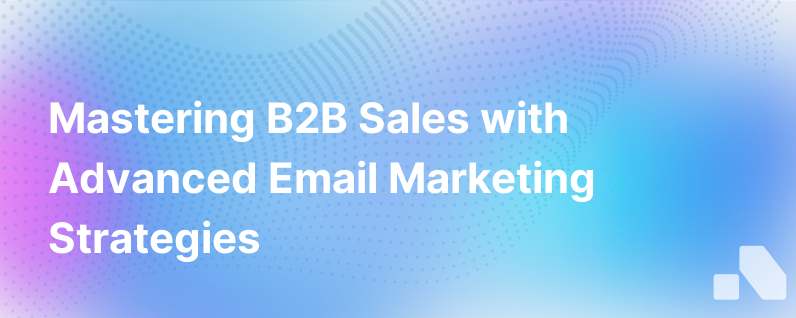
Email marketing remains one of the most effective tools in a B2B marketer’s arsenal. It’s direct, it’s personal, and when done correctly, it can yield impressive results for sales teams. When B2B sales teams leverage email marketing smartly, they can transform how they connect with potential and existing customers, nurture leads, and close deals. In this guide, we'll walk through effective email marketing techniques that can bolster a B2B sales team's strategy.
The Importance of Segmentation and Personalization
Segmentation is crucial to ensure you're sending relevant messages to the right audience. Instead of a one-size-fits-all email blast, segment your contacts based on industry, company size, role in the company, or where they are in the sales funnel. For instance, the content that appeals to C-level executives might differ from what resonates with a technical specialist.
Personalization goes beyond just inserting a person’s name. It extends into the content of the email, ensuring that each recipient feels that the communication is tailored to them. Dive into data analytics to understand customer behavior and preferences, enabling hyper-personalized emails that can significantly increase open rates and click-through rates.
Crafting Irresistible Subject Lines
The subject line is the gatekeeper of your email. It’s what prompts your recipient to open the email or bypass it altogether. For B2B audiences, the subject line should be clear, concise, and convey the value of the email content. It should also be personalized when possible, as personalized subject lines have been shown to increase open rates significantly.
Timing and Frequency
The right timing can enhance the effectiveness of an email campaign. For B2B audiences, weekdays, particularly Tuesday through Thursday, tend to have higher open rates. However, the ideal email frequency can depend on various factors, and there's no one-size-fits-all rule. Monitor engagement metrics in response to varying frequencies to find the optimal cadence for your audience.
The Power of Valuable Content
When it comes to B2B email marketing, content is king. Share insights, research, or case studies that can help your prospects solve challenges or achieve their business goals. The content should position your company as a thought leader and problem-solver in your industry.
Utilizing Email Automation
Automation can significantly enhance the efficiency and effectiveness of B2B email marketing. Tools that enable lead scoring or identify the prospect's stage in the sales funnel can trigger targeted email campaigns ensuring timely and relevant communication.
Metrics to Watch
Essential metrics that B2B sales teams need to monitor include open rates, click-through rates, and, importantly, conversion rates. Measure how effectively your emails move prospects through the sales funnel towards the final goal—closing a sale. Also, keep an eye on the unsubscribe rate as this can be a key indicator of how well your content is being received.
A/B Testing
Regularly conduct A/B tests to refine your email marketing strategies. Test different subject lines, email content, calls-to-action (CTAs), email formats, and send times to continually improve your campaign's performance.
Responsive Design
With mobile devices now a common way to check emails, ensuring your emails are mobile-friendly is non-negotiable. Responsive email design adjusts to the screen size and resolution of the device, making for a better reading experience and increasing the likelihood of engagement.
Compliance with Regulations
Stay compliant with regulations like the GDPR and CAN-SPAM Act. Make sure to obtain consent before sending emails and provide a clear path to unsubscribe. Violating these can result in fines and damage your company’s reputation.
Continuous Improvement
Effective email strategies are not static. As technology, markets, and consumer behaviors change, so must your tactics. Keep up-to-date with the latest trends, tools, and approaches to email marketing.
The Role of Email Marketing in a Larger Strategy
Remember, email marketing is just one component of a holistic B2B marketing strategy. It should be thoughtfully integrated with other channels and touchpoints to provide a cohesive sales journey for the customer.
Wrapping It Up
When B2B sales teams master these techniques, their email campaigns can become a significant driver of success. It’s not just about flooding inboxes with your messages; it’s about the right message, to the right person, at the right time.
As we continue to leverage innovative technologies and strategies, email marketing evolves. However, the fundamentals of understanding your audience, providing value, and building relationships remain paramount.
In the B2B landscape, where decisions are typically more complex and involve longer sales cycles, these tactics can make all the difference. By aligning your email marketing strategy with the buyer's journey, your sales team can effectively nurture leads, strengthen existing customer relationships, and drive growth.
For teams looking to streamline these processes, platforms like Aomni offer sales intelligence tools that can automate research, provide actionable insights, and personalize content—all aimed at helping you close more deals, with less effort. These tools enhance the capacity of email marketing, ensuring your efforts are not just heard, but listened to and acted upon.
Sources:
- B2B email marketing: Proven strategies and examples
- 9 Proven B2B Email Marketing Best Practices for Beginners
- 7 B2B Email Marketing Best Practices (With Real-Life Examples)
- 7 important B2B email marketing KPIs
- B2B email segmentation: 6 ways to segment your contact list
- Learn the most effective email marketing metrics for B2B companies and how to use them to improve your email campaigns. Find out how to track and optimize metrics such as open rate, click-through rate, conversion rate, and more.
- Email Analytics [Research]: 8 Email Marketing Metrics You Should Track
- What is Email Cadence? What Marketers Should Know + Best Practices